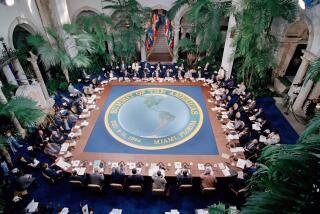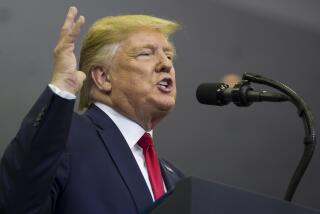A Glimmer of Hope for Global Reforms
- Share via
It’s probably foolish to hope that Larry Summers, soon to become No. 1 at the U.S. Treasury Department, will prove the answer to Asia’s plea for leadership in reforming the world economic system. After all, Summers was championed by the exiting Robert Rubin. In Asia, Rubin is best noted for his successful stewardship of the U.S. economy while Asia went to pot, for bashing Japan for its economic decisions and for throwing cold water on most proposals to reshape the world’s economic architecture. Besides, Summers is a former Harvard prof who sometimes shows Ivy League arrogance at its worst: On visits to Asia, he’d stroll into a full-dress meeting swigging a Diet Coke and lecture Asian officials on what they were doing wrong. But in recent statements, Summers has piqued Asia’s interest by raising the hope that he might prove supportive of reform.
In a speech in Washington in April, Summers stated that the world’s leaders must strengthen the global financial system “to make financial crises less likely and less costly for the world’s people when they do. If the technology and sophistication of modern capital markets have recently helped propagate financial crises more rapidly across the world, it may be that they can also help to drive a faster resolution.” Perhaps, but it is universally agreed that without American support, there will be no global reform to neutralize the destabilizing effects of trillion-dollar, cross-border transactions that originate in the West--and sometimes wreak havoc in the East. There is clearly a need for some kind of controls on the flows of short-term capital into and/or out of national economies; so, too on those high-risk speculative investments known as hedge funds, as well as hideously complicated derivative-type funds and other financial gizmos, are regarded in Asia as inherent threats to financial stability because they have the capacity to cripple economies as well as energize them with the swift movement of investment capital. So, can the world system be amended to minimize the jaws-like teeth of hedge funds without rendering capitalist inventions that lead to vital foreign investment toothless?
Two Asian leaders who insist on reform and who represent national economies whose commitment to capitalist ways is not in question are Australia’s I.J. Macfarlane, governor of that nation’s reserve bank system, and Joseph Yam, head of Hong Kong’s Monetary Authority. Their calls for reform echo loudly across Asia-Pacific. The ordinarily soft-spoken Macfarlane--Australia’s answer to America’s always soft-spoken Federal Reserve Chairman Alan Greenspan--has lately become almost outspoken. Consider this: “Until recently, if you complained about the activities of the hedge funds, you were regarded as paranoid and you received a sermon on the dangers of shooting the messenger.” But now, Macfarlane adds, “no one has a good word to say for them” (except, he forgot, Wall Street). He wants them brought either into a “disclosure net” or into “supervision.” This means, among other things, that international investment schemes need more scrutiny from international institutions, perhaps from the International Monetary Fund. Insists Macfarlane, whose Australian economy has been perking along at a healthy growth rate of more than 4%, despite the Asian flu: “It is simplistic to insist on the totally free movement of capital in all countries and in all circumstances. Financial contagion is essentially an irrational force which tars large groups of countries with the same brush and causes fear to overrule reason.”
Macfarlane has a strong ally in Hong Kong. There, Yam has criticized those gigantic Western hedge funds that devastate small Asian economies by taking their money out just as quickly as they help them by putting them in. Yam rails about “the relative lack of appreciation, outside of this region, of the predicament that smaller, open markets face in the increasingly liberalized international financial system.” He prefers the kinds of reforms advocated by Macfarlane, including Germany’s thoughtful proposal for an “international credit register” to open large funds to more scrutiny, to reduce the downside exposure of comparatively small Asian economies. Macfarlane and Yam believe that by failing to reform, the whole wealth-creating system is put at risk. They break ranks with their colleagues on Wall Street who support the status quo; they believe the status quo is a recipe for world economic decline. And they agree that Rubin presided brilliantly over the great, voracious, shop-until-you-drop U.S. economy that helped keep export-dependent Asian economies from falling even deeper in the well. But is there anything else America can do for Asia except buy?
That is the overarching question for Rubin’s hand-picked successor. On his infrequent visits to Asia, Summers has struck Asians as rude and closed-minded--in short, as little more than the average visiting U.S. official. But now that Summers is about to get the top Treasury job, Asians hope he will transcend Rubin, get the ear of President Clinton and Greenspan, and advocate that America join Macfarlane and Yam on the road to reform.
Summers himself warns about complacency, advocates strong national growth policies based on heating up domestic demand and urges a strengthening of the global financial system. Though vague so far on details, it’s his evident lack of complacency that is driving Asia’s hope that Summers will somehow help illuminate the darkness by reintroducing progressive U.S. leadership to world economic reform. In particular, they hope Summers won’t hedge on the hedge-fund menace.
More to Read
Inside the business of entertainment
The Wide Shot brings you news, analysis and insights on everything from streaming wars to production — and what it all means for the future.
You may occasionally receive promotional content from the Los Angeles Times.










